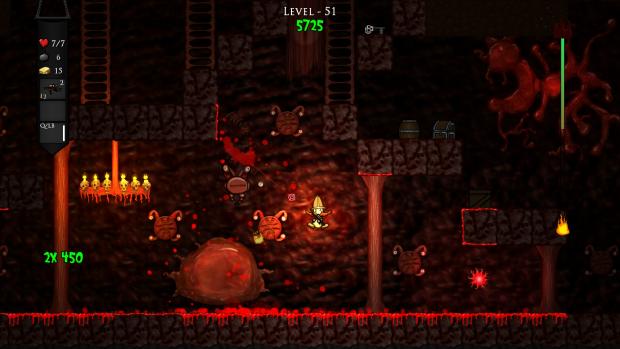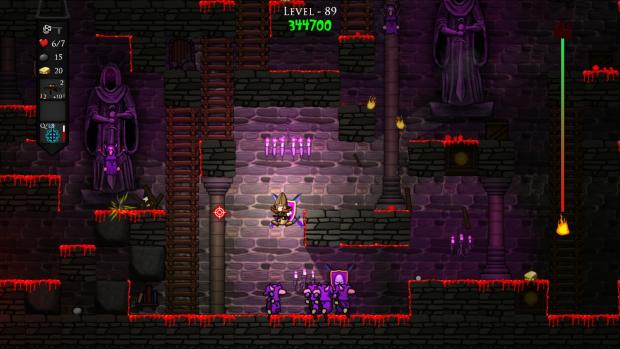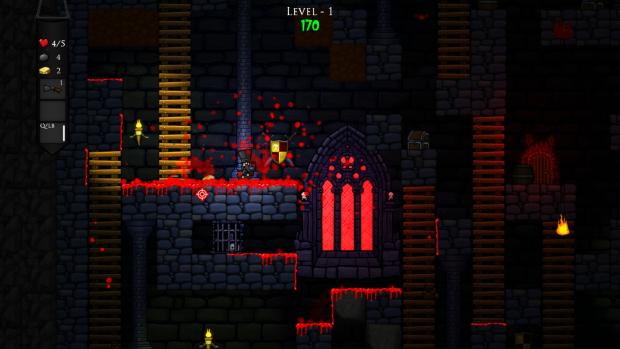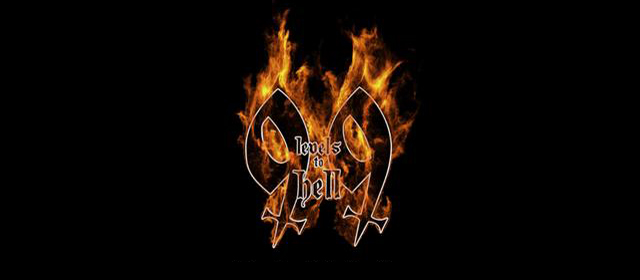To call 99 Levels to Hell a parody is incorrect, yet it’s somewhat fitting. Spelunky, when it was released last year, took many by surprise. For myself it was the measured pace of the game that was its most interesting aspect. To call Spelunky slow would do it no credit, but its gameplay pace was measured and thoughtful, with the player always seemingly one hasty movement away from death.
99 Levels to Hell follows the same set up as Spelunky: traverse a series of individually generated rooms, defeating enemies, dodging traps, and trying to find the key and exit to the next floor – but it’s a much messier game, visually. The gallons of viscera hurled around the stage upon enemy death give 99 Levels to Hell a somewhat tasteless attitude to violence, but that feels like its point. The game gives you a shotgun straight away, puts you in a room, and yells ‘GO!’ as a guitar twiddles along to your hasty door hunt (as with Spelunky, dawdling in a room will cue an evil instant kill foe for you to avoid).

The fact enemies explode and paint the level red just feeds into 99 Levels to Hell’s insatiable bloodlust and breakneck pace. This is why it feels almost as if the design is a parody. Or if not an attempt to parody, it feels like an inverted Spelunky tonic. 99 Levels to Hell is a way to play a game that’s like Spelunky, but one in which you can scream and cackle like a small child, tearing through stages with reckless violence. You get combo multipliers for killing lots of enemies in quick succession, so it feels right to rush.
Where Spelunky gives you a short range whip and encourages you to think about every spent bomb, 99 Levels to Hell says ‘your gun breaks most blocks, there’s plenty of bombs around, and you can pretty much moon jump everywhere, now go nuts!’
That’s not to say that 99 Levels to Hell is thoughtless. Once you are past the first ten floors things get more interesting, with spike pits forcing you to move even faster and more cunning enemies testing your aiming abilities, and by floor 20 the game is genuinely hard. It’s still a zippy game, focusing more on twin stick skills trained in arcade-y shooters than in careful platforming, but don’t enter 99 Levels to Hell thinking it will be an easy ride, as it isn’t afraid to bombard you with some very ferocious foes.

Difficulty is also victim to its rogue-like design. The beginning shotgun is powerful, but the magic staves and machine guns you can find give much more range. That said, you’ll be reluctant to drop the shotgun should you find a couple of power upgrades before an alternative crops up.
Unfortunately, 99 Levels to Hell has its fair share of issues, many of which feel born from its humble origins. The art design is sporadic, with a hodge-podge of styles and messy character models (and not a cohesive style of messy like Edmund McMillan’s output). Hit detection can also feel occasionally off, with foes sometimes landing hits that seem as though they shouldn’t. This is more annoying on the bosses, as they can feel stupidly difficult, and the mucky hit detection doesn’t help matters.

Lastly, the game has some quirks. An umbrella item might appear that will jump you forward a number of floors. I found one on floor 18 and landed in the early 20s, where I promptly died. This didn’t count as reaching the floor 20 checkpoint, and I had to restart from floor 10. It’s a minor niggle, admittedly, but it didn’t stop me feeling as though I’d been cheated out of progress. Then again, this game has gamble doors that throw you forward or backwards at random. Guess it’s just not trying to be nice, really, is it?
VERDICT: 99 Levels to Hell is a fine, if slightly trashy Spelunky-alike. If Spelunky is Indiana Jones, then 99 Levels to Hell is its Grindhouse equivalent, focusing more on fast, expendable entertainment than its more thoughtful cousin. A few presentational quirks aside, 99 Levels to Hell is solid if you’ve ever thought that Spelunky could do with being more like an arcade shooter, or if you’ve ever imagined that Binding of Isaac should be viewed from the side.

DECENT. A 6/10 indicates that, while this game could be much better, it still has a fair amount to offer the player. It might be an interesting title sabotaged by its own ambition, or a game denied greater praise by some questionable design choices. Don’t avoid it outright, but approach it with caution.
Review code provided by the publisher.





